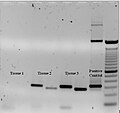Polymerase chain reaction
Polymerase Chain Reaction (PCR) is a widely used laboratory technique in molecular biology to amplify a single copy or a few copies of a segment of DNA across several orders of magnitude, generating thousands to millions of copies of a particular DNA sequence. Developed in 1983 by Kary Mullis, PCR is now a common and often indispensable technique used in medical and biological research labs for a variety of applications.
Overview[edit]
PCR enables the selective amplification of a specific region of DNA from a complex pool of DNA. The process relies on thermal cycling, consisting of cycles of repeated heating and cooling of the reaction for DNA melting and enzymatic replication of the DNA. Primers (short DNA fragments) containing sequences complementary to the target region along with a DNA polymerase (after which the method is named) are key components to enable selective and repetitive amplification.
Process[edit]
The PCR process generally involves several key steps:
- Denaturation: The double-stranded DNA is heated to a high temperature to separate it into two single strands.
- Annealing: Temperature is lowered to enable the DNA primers to attach to the template DNA.
- Extension: DNA polymerase synthesizes a new DNA strand complementary to the DNA template strand by adding dNTPs (deoxynucleoside triphosphates) in a sequence dictated by the DNA template and primers.
This cycle is typically repeated 25-35 times to produce the required quantity of DNA.
Applications[edit]
PCR has a broad range of applications including:
- Genetic testing: Identifying genetic disorders from small samples of DNA.
- Forensic science: Amplifying DNA from crime scene evidence.
- Infectious disease: Detecting the presence of pathogen DNA in blood or tissues.
- Research: Cloning DNA sequences and generating probes for Southern blotting.
Variations[edit]
Several variations of PCR exist, including:
- Real-Time PCR or Quantitative PCR (qPCR): Allows quantitative measurement of DNA.
- Reverse Transcription PCR (RT-PCR): Used for amplifying DNA from RNA.
- Multiplex PCR: Allows amplification of multiple targets in a single PCR setup.
Challenges and Limitations[edit]
While PCR is a powerful and versatile tool, it is not without limitations. These include the potential for contamination leading to false results, the need for precise thermal cycling, and limitations in the size of DNA that can be amplified.
See Also[edit]
-
Polymerase chain reaction
-
Polymerase chain reaction
-
Polymerase chain reaction
-
Polymerase chain reaction
-
Polymerase chain reaction
-
Polymerase chain reaction
-
Polymerase chain reaction
-
Polymerase chain reaction
-
Polymerase chain reaction
-
Polymerase chain reaction
-
Polymerase chain reaction
Ad. Transform your life with W8MD's Budget GLP-1 injections from $49.99


W8MD offers a medical weight loss program to lose weight in Philadelphia. Our physician-supervised medical weight loss provides:
- Weight loss injections in NYC (generic and brand names):
- Zepbound / Mounjaro, Wegovy / Ozempic, Saxenda
- Most insurances accepted or discounted self-pay rates. We will obtain insurance prior authorizations if needed.
- Generic GLP1 weight loss injections from $49.99 for the starting dose of Semaglutide and $65.00 for Tirzepatide.
- Also offer prescription weight loss medications including Phentermine, Qsymia, Diethylpropion, Contrave etc.
NYC weight loss doctor appointmentsNYC weight loss doctor appointments
Start your NYC weight loss journey today at our NYC medical weight loss and Philadelphia medical weight loss clinics.
- Call 718-946-5500 to lose weight in NYC or for medical weight loss in Philadelphia 215-676-2334.
- Tags:NYC medical weight loss, Philadelphia lose weight Zepbound NYC, Budget GLP1 weight loss injections, Wegovy Philadelphia, Wegovy NYC, Philadelphia medical weight loss, Brookly weight loss and Wegovy NYC
|
WikiMD's Wellness Encyclopedia |
| Let Food Be Thy Medicine Medicine Thy Food - Hippocrates |
Medical Disclaimer: WikiMD is not a substitute for professional medical advice. The information on WikiMD is provided as an information resource only, may be incorrect, outdated or misleading, and is not to be used or relied on for any diagnostic or treatment purposes. Please consult your health care provider before making any healthcare decisions or for guidance about a specific medical condition. WikiMD expressly disclaims responsibility, and shall have no liability, for any damages, loss, injury, or liability whatsoever suffered as a result of your reliance on the information contained in this site. By visiting this site you agree to the foregoing terms and conditions, which may from time to time be changed or supplemented by WikiMD. If you do not agree to the foregoing terms and conditions, you should not enter or use this site. See full disclaimer.
Credits:Most images are courtesy of Wikimedia commons, and templates, categories Wikipedia, licensed under CC BY SA or similar.
Translate this page: - East Asian
中文,
日本,
한국어,
South Asian
हिन्दी,
தமிழ்,
తెలుగు,
Urdu,
ಕನ್ನಡ,
Southeast Asian
Indonesian,
Vietnamese,
Thai,
မြန်မာဘာသာ,
বাংলা
European
español,
Deutsch,
français,
Greek,
português do Brasil,
polski,
română,
русский,
Nederlands,
norsk,
svenska,
suomi,
Italian
Middle Eastern & African
عربى,
Turkish,
Persian,
Hebrew,
Afrikaans,
isiZulu,
Kiswahili,
Other
Bulgarian,
Hungarian,
Czech,
Swedish,
മലയാളം,
मराठी,
ਪੰਜਾਬੀ,
ગુજરાતી,
Portuguese,
Ukrainian





